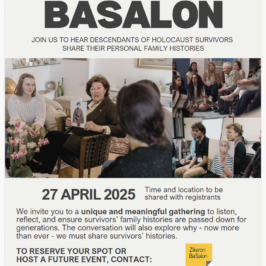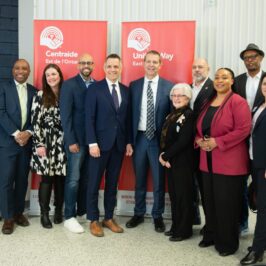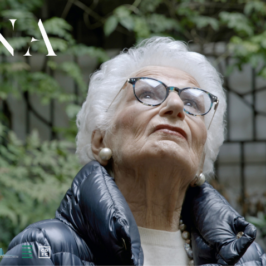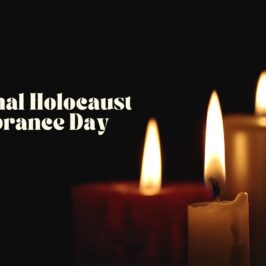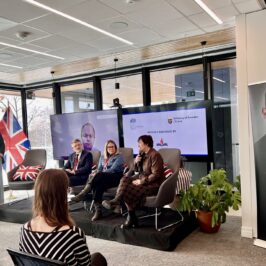By Sheila Hurtig Robertson
A highlight of Holocaust Education was the virtual presentation by renowned author Helen Epstein entitled The Shadow of the Holocaust on the Lives of Children and Survivors: Is it Possible to Move Beyond its Grip?
Setting the stage for her remarks was Chaim Katz, a PhD student at the University of Toronto and a grandson of survivors. He described the experiences of himself and his peers and their frustrations in coping with the antisemitism of student groups who sponsor anti-Israel events. Katz, who is involved in many aspects of student life on campus, said: “I know what antisemitism can lead to if ignored; we must learn from the past or else we are doomed to repeat it.”
Helen Epstein’s presentation was an intensely personal account of her life and that of her parents, Kurt Epstein and Franci Rabinek Solar, both Holocaust survivors and the sole survivors of their families. The ‘shadow’ of the Holocaust has been with me all my life,” she said, adding that she saw the Auschwitz tattoo on her mother’s forearm from the moment of her birth. “The tattoo disturbed me so profoundly that for a very long time, I could not remember its numbers.”
Both parents had met years before when Franci, born in 1920, was a 13-year-old and Kurt was her 29-year-old swim coach. Not yet a couple, both were caught up in the Nazi occupation of Czechoslovakia in March 1939 and both survived internment in Terezin concentration camp, Auschwitz, and slave labour camps. After liberation they returned to Prague where, in June 1946, they ran into each other. Franci was a widowed, 26-year-old fashion designer and Kurt, then 41, was a two-time Olympian in water polo and a bachelor. Twenty-four hours after their first date, they moved in together. Helen was born in November 1947.
Following the communist takeover of Czechoslovakia in February 1948, the Epsteins embarked for New York City where they became part of the city’s Czech survivor community that included Jews and non-Jewish survivors and anti-Nazi and anti-communist refugees and was politically and socially liberal. Talk about the trauma of the war was a constant.
“So the widespread trope of silence about the war was not part of my experience and my impression of physical and psychological damage from the Shoah was not restricted to Jewish adults,” said Epstein. However, near silence was the norm outside of her home.
Epstein’s formative years were spent in the Upper West Side, Manhattan, a largely American Jewish neighbourhood. As she wrote in her first book, Children of the Holocaust, she was haunted by Holocaust iconography. Trains. Chimneys. Smoke. Barbed wire. Yellow stars. Reading the book, classmates were surprised to discover continual behavioural aspects of the Holocaust ‘shadow’: her mother was suicidal; her father was given to sudden rages; she had no grandparents or other close family.
In explaining the beginning of her consciously thinking about the inter-generational aspect of historical trauma, Epstein said that her upbringing as a child of survivors primed her to spend her university years at the Hebrew University of Jerusalem studying musicology and literature. Earlier, in 1967, she became one of thousands of volunteers from all over the world to work in the place of soldiers who had been mobilized for the Six-Day War. It was during her time in Israel that her research into the 2nd Gen began.
So, too, did her career as a journalist. While living in Israel, Epstein was determined to return to the city of her birth as soon as possible, and she found herself in Prague in August 1968. Caught up in the Soviet invasion, her gripping eyewitness account was published in The Jerusalem Post. Returning to New York City after graduating in 1970, she enrolled in Columbia University’s Graduate School of Journalism and eventually became an author of non-fiction books.
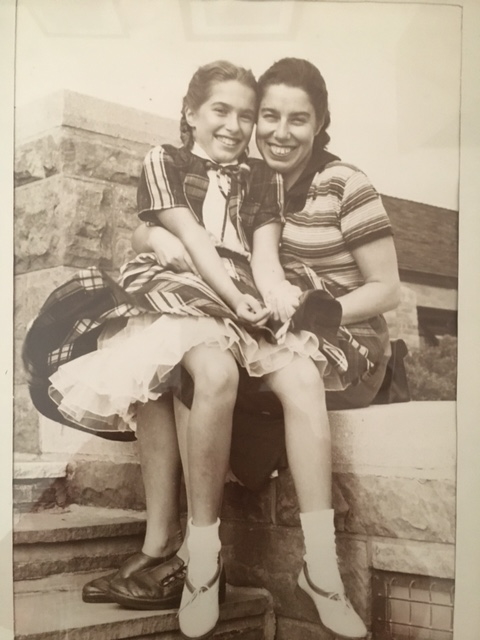
Over the course of her five-decade career. Epstein’s “hunch that history, culture, resilience, and trauma have been passed on from one generation to another has given rise to hundreds of books and works of art as well as research studies in such fields as neuroscience and biochemistry. Many of those books and studies, including mine, have been used by other groups interested in the intergenerational transmission of trauma such as Armenians, Rwandans, Cambodians, African Americans, and Native Americans. Providing a framework and words for so many peoples’ experience is an author’s dream … but it has taken me a very long time to fully understand the dimensions of the long ‘shadow’ of the Shoah,” and she wonders if anyone can ever move beyond its grip.
A pivotal moment came in the fall of 1976. Freelancing for the New York Times, Epstein pitched the editors her idea for an article on the 2nd Gen. Overcoming their scepticism, she set to work on wide-ranging interviews that formed the basis for the article which was the cover feature of The New York Times Magazine in June 1977 (THE HEIRS OF THE HOLOCAUST – The New York Times (nytimes.com)).The only way she could cope with the “emotional onslaught” the article unleashed was to detach emotionally as she was questioned extensively about what she had written. “I received hundreds of intimate letters attesting to the ‘shadow’ of the Holocaust and was invited to speak at dozens of libraries, universities, synagogues, and churches,” she said.
Epstein, by then a journalism professor at New York University, received a book contract and “set out to find a group of people who, like me, were possessed by a history they had never lived.” The result was Children of the Holocaust, published to wide acclaim in 1979. The year-long writing process had proved to be difficult. It was, she said, as though she was driving through a snowstorm, unable to see ahead or behind the sentence she was working on. “I still doubted that my subject was real … much later I would understand that my doubting and sense of driving through a snowstorm was my way of describing association and that I had been employing that psychological defence since early childhood.”
She explained that growing up with parents who dissociated, or who suffered from alexithymia, not expressing emotions in words, had many consequences. “Without a larger extended family, especially grandparents, to model alternatives, I and other sons and daughters of survivors adopted their models of behaviour and communication. I was intense, decisive, prolific, and dead serious about most things. I regarded most forms of play as a waste of time, and I was largely unaware of fantasy. As a friend and lover, I was loyal, protective, and a terrific listener, but not verbally or emotionally expressive. At age 73 I am still discovering how unusual my expectations are around family, separation, boundaries, and loyalty are, especially in a North American context, and in my relations with my two adult sons.”
In talking with thousands of sons and daughters of survivors all over the world, Epstein has become aware, not only of individual dissociation, but of group and national dissociation. “Danger, discrimination, and shaming led many in the survivor community to deny, disavow, or minimize their victimization on the war,” she said, adding that many survivor families played down their history, even in Israel where survivors were marginalized as diaspora Jews and sometimes denigrated as “sheep to the slaughter”.
Franci died unexpectedly in 1989 of a brain aneurysm. In the years before, Epstein had hoped that after writing Children of the Holocaust she would be able write about other subjects. And she did, but found she wasn’t finished with the “material in the iron box I had opened.” The result was Where She Came From: A Daughter’s Search for Her Mother’s History (1997), as sequel to her ground-breaking first book and which covered the history of Jewish women up to her birth. “The Shoah had caused a chasm in survivor family histories … and I wanted to bridge that chasm,” she said.
Eventually, 10 years after Franci’s death, she turned to examining the ‘shadow’ of their complex relationship. This came after she had travelled many times to the Czech Republic, researched, written, and published where her mother came from. The result was another Holocaust memoir entitled The Long Half Lives of Love and Trauma (2019), which took 15 years to write. “It traces the thread of dissociation that runs through my life as well as the lives of many sons and daughters I’ve talked to,” she said.
In concluding her presentation, Epstein said: “At 73, the Shoah is never far from my consciousness. It colours my thoughts and feelings about nearly everything … Last year I was diagnosed and treated for cancer. My parents’ war experience helped me get through it, but also helped me to understand, through my own body, that the word ‘survivor’ is not owned by the Holocaust community. In 2021 the Holocaust has been contextualized by the recognition and study of medical survivors and survivors of other genocides who have created their own literature and art out of mass murder.
“Collective as well as individual trauma has been increasingly made visible by cultural and political changes. I’ve written about Holocaust survivors and their families now for the past 50 years. I’m married to the son of Holocaust survivors, and we have raised our two sons with a consciousness of our history, but we have tried not to force it on them.
“Now, older than both my parents when they died, I am finally ready to step out of the shadow of the Holocaust.”
Postscript: Earlier this year, Epstein published a memoir of her late mother called Franci’s War.
In the summer of 1942, twenty-two year-old Franci Rabinek arrived at Terezín, forty miles north of her home in Prague. It would be the beginning of her three-year journey from Terezín to the Czech family camp in Auschwitz-Birkenau, to the slave labor camps in Hamburg and Bergen Belsen. After liberation by the British in April 1945, she finally returned to Prague.
Franci was known in her group as the Prague dress designer who lied to Dr. Mengele in Auschwitz, saying she was an electrician, an occupation that both endangered and saved her life. In this memoir, she offers her intense and candid account of those years. Franci’s War is the powerful testimony of one incredibly strong young woman who survived.
A Sampling of Audience Reactions
From Dr. Ruth Samuel Tenenholz, Haifa, Israel:
I greatly enjoyed the webinar in spite of the ridiculous hour for me here in Haifa. Everything was meaningful. Chaim spoke so eloquently, and I identified with much of what he said. Your final speaker moved me to tears.
I am a great admirer of Helen Epstein and will now reread some of her books. She is eloquent and comes through the screen as if she is right there with you. I wish her health and wonderful things.
I am a retired professor of English literature and my focus is on the shadow of Shoah in literature and have written several books in different languages about the topic. Today I am connected to Bar-Ilan and do research into the 2nd Gen’s obligation to take over the burden of memory.
Thank you again for a lovely and informative night.
From Peppy Margolis:
I was pleased to attend the Zoom presentation about how trauma has affected the 2nd Gen.
My turbulent childhood was similar to Helen’s, especially my father’s rage and anger. Reading Helen’s book, Children of The Holocaust, helped me to cope and manage living with traumatized parents.
I was active in the 2ND Gen movement and attended the early programs in New York City. I chaired a NJ conference at Kean University in 1990.
I studied about the affects of the Holocaust on our traumatized parents who had post-traumatic stress. It was my conclusion that these attitudes and behaviours influenced children of survivors. I produced a film, “The 2nd Gen- Ripples from The Holocaust,” about ten 2nd Gen who were members of my Raritan Valley Community College Holocaust Institute of the RVCC community of Central Jersey. This film confirmed my findings and helped many 2nd Gen groups explore their feelings and experiences as 2nd Gen.
I am proud that Amcha translated the 2nd Gen film to Hebrew for a program in Israel last May.
However, like Helen, I was initially challenged by many 2nd Gen colleagues who years later agree with the premise that trauma can affect families of the Holocaust and genocides. Like Helen, I retired and recently passed the torch to my daughter, who chose to speak about her resilient grandparents. They are smiling from heaven knowing the legacy continues.
Thanks for your hard work to bring us outstanding educational programs.

